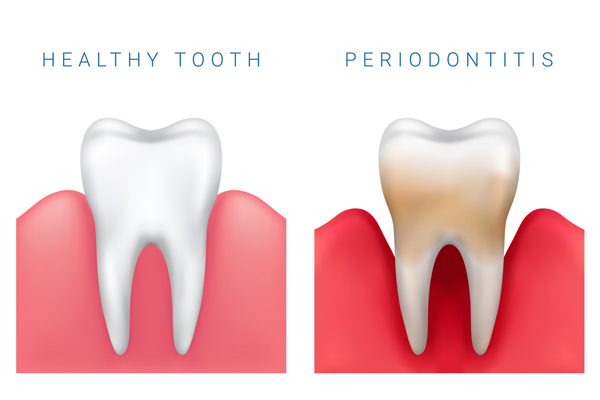Why Doesn't Early Gum Disease Hurt?
Posted on 10/15/2024 by Brush & Floss Office |
 Have you ever felt a twinge of pain when brushing your teeth? Or noticed your gums bleeding while flossing? These can be warning signs of gum disease, also known as periodontal disease. But here's the catch: in its early stages, gum disease often goes unnoticed because it's painless. Have you ever felt a twinge of pain when brushing your teeth? Or noticed your gums bleeding while flossing? These can be warning signs of gum disease, also known as periodontal disease. But here's the catch: in its early stages, gum disease often goes unnoticed because it's painless.
The Silent Destroyer: Understanding Gum Disease
Gum disease is an infection that affects the tissues surrounding your teeth, including your gums and the bone that holds your teeth in place. It starts with plaque buildup, a sticky film that forms on your teeth from food debris and bacteria.
In the early stage, called gingivitis, the bacteria irritate your gums, causing them to become red, swollen, and bleed easily. But because this inflammation doesn't directly affect the nerves in your gums, you might not feel any pain. It's like a slow, silent infection that can silently erode your oral health.
Why Early Detection is Crucial
The insidious nature of gum disease is why early detection and treatment are vital. If left untreated, gingivitis can progress to periodontitis, a more severe form of the disease that destroys the bone supporting your teeth. This can eventually lead to tooth loss and other serious health complications.
The good news is that gum disease is preventable and treatable, especially in its early stages. With a good oral care routine and regular dental checkups, you can keep gum disease at bay and maintain your healthy smile.
Protecting Your Smile: A Multi-Pronged Approach
1. Effective Oral Care Habits
The foundation of gum disease prevention is effective oral hygiene at home. Brushing your teeth twice a day for two minutes each time, flossing daily, and using an antiseptic mouthwash helps disrupt plaque buildup and remove food particles before they can harden into tartar.
2. The Importance of Regular Dental Checkups
Even with a diligent at-home routine, professional dental cleanings are essential. Your dental hygienist will remove any remaining plaque and tartar buildup, especially in those hard-to-reach areas. During your checkups, your dentist will assess your overall oral health and identify any early signs of gum disease.
3. Early Intervention for Optimal Outcomes
If you are diagnosed with gum disease, don't panic. Early intervention offers excellent chances of successful treatment and preventing further damage. Depending on the severity, treatment might involve deep cleaning to remove bacteria below the gum line, antibiotics to fight infection, and in some cases, procedures to regenerate bone and gum tissue.
Your Role in Maintaining a Healthy Smile
By prioritizing your oral health with effective oral care habits, regular dental visits, and addressing gum disease early, you can protect your smile and enjoy a lifetime of healthy teeth. Remember, even though early gum disease is painless, it doesn't mean it's harmless. Be proactive and take charge of your oral health. Together with your dental team, you can prevent gum disease and ensure your smile stays healthy and vibrant for years to come.
|
|